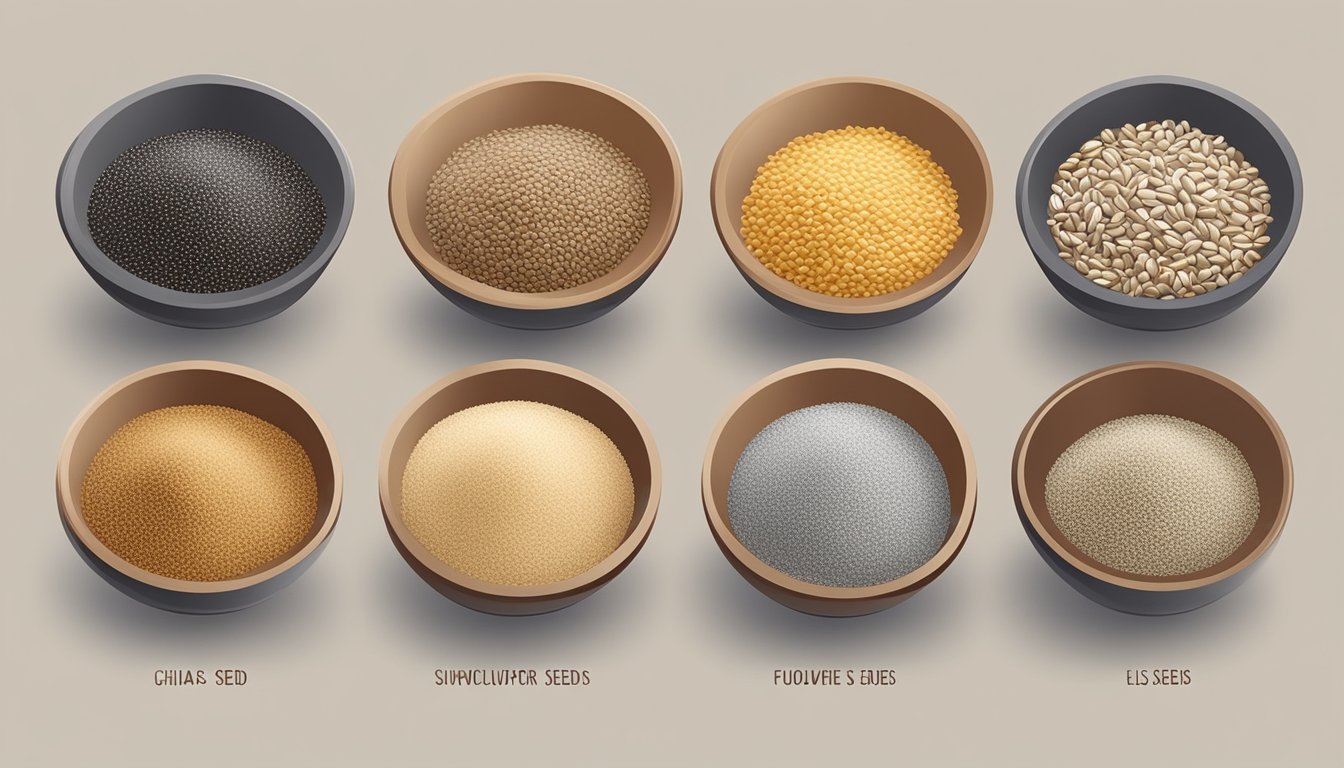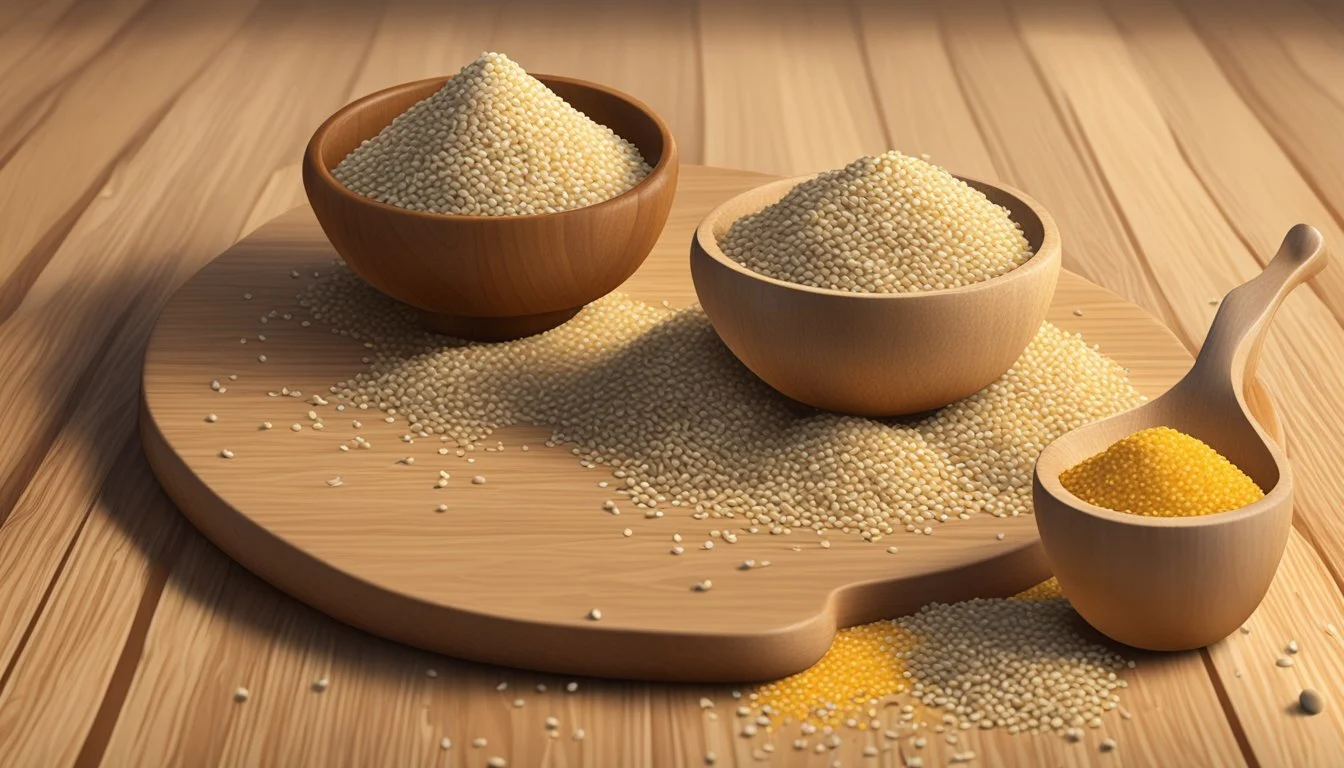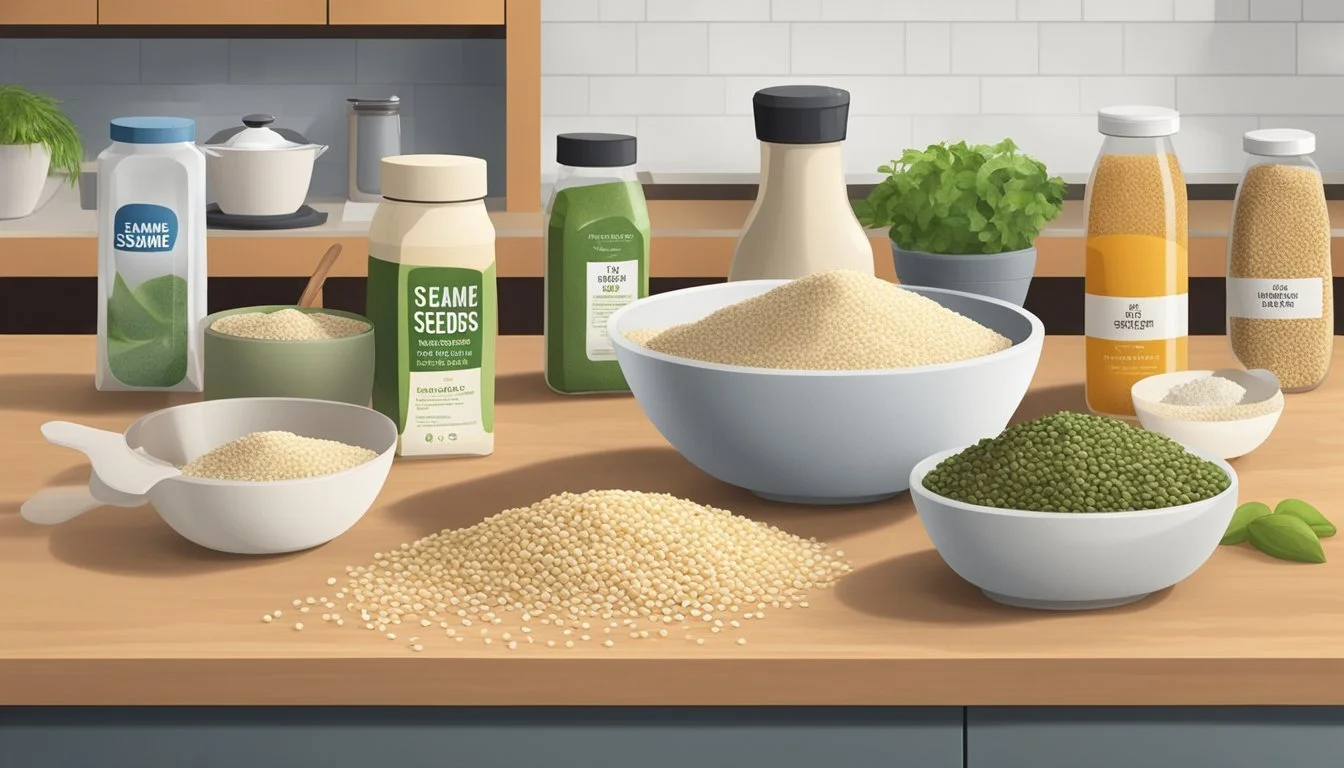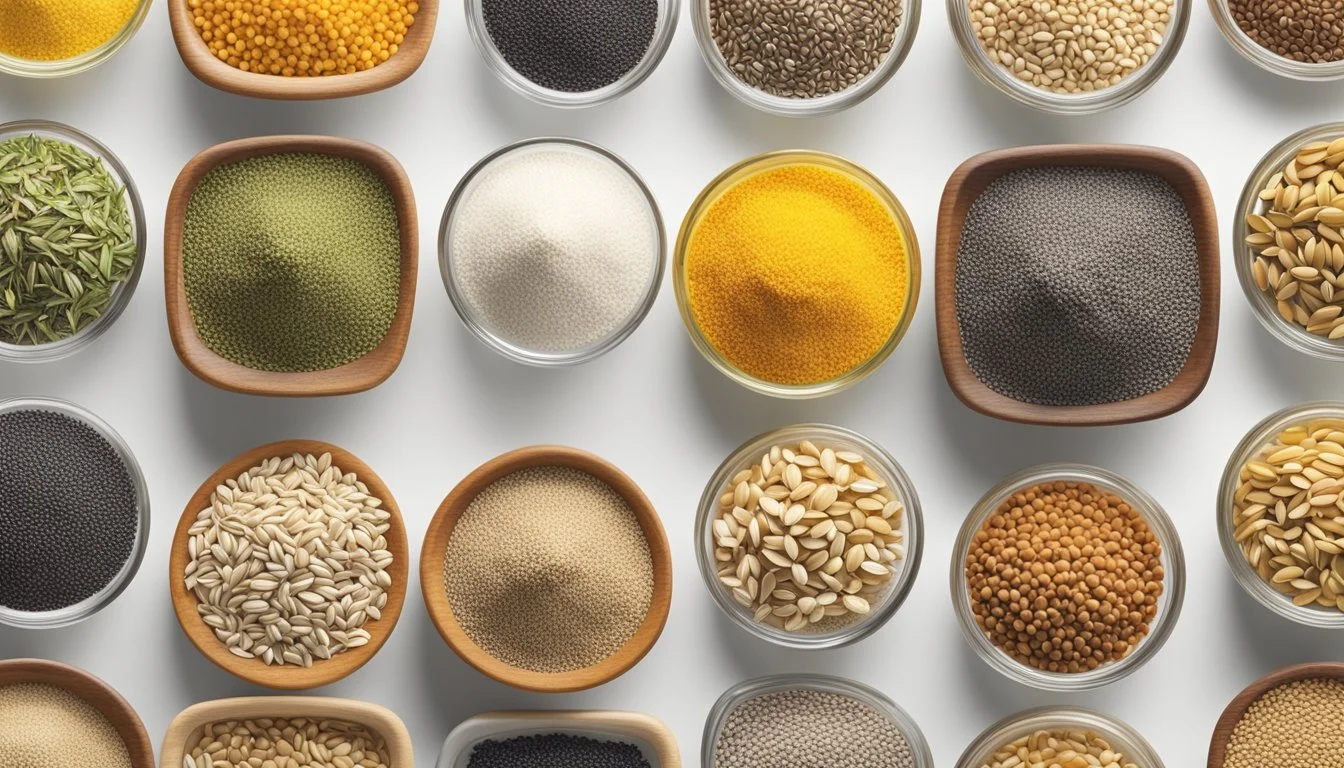Sesame Seeds Substitutes
Top Alternatives for Your Recipes
Many recipes call for sesame seeds to add a distinct nutty flavor and crunchy texture, but there are several substitutes that can work when these tiny seeds are not available. Poppy seeds and chia seeds offer a mild flavor and similar crunchy texture, making them suitable replacements in most dishes. For a closer match in taste and texture, hemp seeds can be a practical alternative, though they may not be as widely available.
Sunflower seeds and pumpkin seeds are also excellent options for those needing a substitute, especially in baked goods and salads. Both provide a slightly different, yet complementary, flavor profile. Beyond their culinary uses, these alternatives also offer beneficial nutrients, making them not only versatile in cooking but also a healthy addition to your diet.
For those specifically interested in the health benefits, many sesame seed substitutes like flax seeds and pine nuts are packed with essential minerals and healthy fats. This makes them ideal choices for maintaining nutritional value while achieving the desired taste and texture in various recipes.
Understanding Sesame Seeds
Sesame seeds are tiny, oil-rich seeds that are integral to many culinary traditions. They offer various health benefits and come in different varieties, each with unique characteristics.
Nutritional Profile
Sesame seeds are packed with essential nutrients. They are rich in protein, making them beneficial for muscle repair and growth. They also contain significant amounts of fiber, which aids in digestion and maintains bowel health.
These seeds are a good source of essential minerals such as magnesium, calcium, zinc, iron, selenium, manganese, and phosphorus. They also provide beneficial omega-3 and omega-6 fatty acids, which are important for heart health. Additionally, sesame seeds contain antioxidants, vitamin E, and B vitamins, which support overall health and wellness.
Culinary Uses
Sesame seeds are extremely versatile in cooking. They add a nutty flavor and crunchy texture to various dishes. Commonly used in baking, they are an excellent topping for breads, rolls, and other baked goods.
In salads, sesame seeds provide a pleasant crunch and can be found in dressings and as a garnish. They are popular in stir-fries and with noodles, enhancing the dishes with both flavor and texture. Additionally, sesame oil, derived from the seeds, is a staple in many Asian and Middle Eastern dishes, known for its rich, nutty aroma.
Varieties
There are several varieties of sesame seeds, each with unique qualities. White sesame seeds are the most common and have a mild flavor. They are often found hulled, meaning their outer shell is removed, making them less bitter.
Black sesame seeds have a stronger flavor and a slightly nutty taste, making them suitable for dishes where a more pronounced flavor is desired. They also have a higher antioxidant content compared to white sesame seeds. Hulled and unhulled varieties offer different textures and flavors, making sesame seeds adaptable to various culinary needs.
Allergy Considerations
While sesame seeds are nutritious, they are also a common allergen. Individuals with a sesame allergy may experience symptoms such as hives, swelling, difficulty breathing, and anaphylaxis.
It's crucial to read food labels carefully and be aware of potential cross-contamination in restaurants and food processing plants. People with sesame allergies should avoid all forms of sesame, including oil and tahini, to prevent allergic reactions.
Primary Sesame Seed Substitutes
Sesame seeds are known for their distinct nutty flavor and crunchy texture. Some excellent substitutes include sunflower seeds, pumpkin seeds, chia seeds, and flax seeds.
Sunflower Seeds
Sunflower seeds offer a delectable nutty flavor and a satisfying crunch, making them a perfect alternative to sesame seeds. In cooking, they can be used in salads, baked goods, and even as toppings for vegetables.
They contain vitamins E and B1, which contribute to numerous health benefits. Sunflower seeds are versatile and can be incorporated into both savory and sweet dishes, mirroring the role sesame seeds typically play.
Pumpkin Seeds
Pumpkin seeds, another great substitute, have a nutty flavor and crunchy texture. They are commonly used in salads and as toppings for baked goods. Rich in magnesium, zinc, and omega-3 fatty acids, pumpkin seeds provide multiple health benefits.
They are an excellent source of protein and are often consumed as a snack. Their versatility allows them to be included in various recipes in place of sesame seeds, adding both flavor and nutritional value.
Chia Seeds
Chia seeds, though not as aromatic, are a great substitute due to their impressive health benefits, including high levels of fiber and omega-3 fatty acids. These seeds can be easily integrated into smoothies, yogurts, and cereals.
Their unique gelling property also makes them a good binding agent in some baked goods and desserts. Chia seeds add a subtle crunch and a boost of nutrition without altering the overall taste of the dish significantly.
Flax Seeds
Flax seeds are a healthy alternative with a subtle nutty flavor and significant health benefits. They are rich in fiber and lignans, which can positively impact cardiovascular health and lower the risk of certain cancers.
Flax seeds can be used in baking, salads, and smoothies. They work well in both sweet and savory recipes, making them a versatile ingredient in the kitchen. Their nutritional profile makes them a valuable addition when seeking substitutes for sesame seeds.
Secondary Substitutes and Alternatives
For those seeking alternatives to sesame seeds, several secondary options such as hemp seeds, poppy seeds, pine nuts, and mixed nuts and seeds offer diverse flavors and textures suitable for various dishes.
Hemp Seeds
Hemp seeds provide a close match to sesame seeds in both flavor and texture. They have a mild, nutty taste and are slightly softer, making them suitable for sprinkling on salads, smoothies, and grain bowls.
Health benefits include high levels of protein, essential fatty acids, and fiber. Additionally, these seeds are packed with vitamins and minerals like magnesium, zinc, and iron, boosting nutritional value when integrated into meals.
Hemp seeds can easily be incorporated into cooking by using them in stir-fries, roasted vegetables, or as a topping for breads and pastries.
Poppy Seeds
Poppy seeds are another excellent substitute for sesame seeds, especially in baking and as a topping for various dishes. They impart a mild, nutty flavor and are slightly smaller and darker compared to sesame seeds, offering a unique visual appeal.
These seeds are frequently used in baking, appearing in cakes, muffins, and breads. They also provide essential minerals such as magnesium, zinc, iron, and calcium, contributing to overall health.
Poppy seeds work well as a topping for noodles and salads, enhancing both flavor and nutrition.
Pine Nuts
Pine nuts stand out as an alternative due to their unique crunch and rich, buttery taste. They are ideal for adding texture and flavor to salads, pasta dishes, and grain bowls.
Pine nuts have high levels of protein and healthy fats, making them nutritionally beneficial. They blend well in cooking, particularly in roasted vegetable dishes and stir-fries.
They also serve as a crunchy topping that adds a nutty flavor to various recipes, enriching the culinary experience.
Nuts and Seeds Mix
A mix of chopped nuts and seeds can also replace sesame seeds in many recipes. This mix often contains ingredients like sunflower seeds, pumpkin seeds, and various chopped nuts, providing a complex blend of flavors and textures.
Such mixes can enhance salads, grain bowls, and baked goods, contributing a rich and varied taste profile.
Using a nuts and seeds mix in cooking offers a versatile option, fitting seamlessly into both sweet and savory dishes. This variety ensures that the desired nutty flavor and crunch are achieved, catering to diverse culinary needs.
Specialty Substitutes
Specialty substitutes for sesame seeds bring unique flavors and textures to dishes, making them ideal for a variety of culinary applications. These alternatives include tahini, roasted almonds, and pistachio seeds.
Tahini
Tahini, a paste made from ground sesame seeds, provides a smooth and creamy texture with a nutty flavor. It is highly versatile and works well in dressings, soups, and baked goods. This substitute is especially effective in recipes that require the essence of sesame without the texture of whole seeds. Rich in essential minerals like calcium and iron, tahini also adds nutritional value to dishes.
Roasted Almonds
Roasted almonds offer a crunchy texture and a rich, nutty flavor that can enhance salads, desserts, and baked goods. When finely chopped, they mimic the size and texture of sesame seeds. Roasting the almonds deepens their flavor, making them a robust replacement in both sweet and savory recipes. They are also packed with protein and healthy fats, contributing to a nutritious diet.
Pistachio Seeds
Pistachio seeds bring a unique nutty flavor and a vibrant green hue to salads and baked goods. They provide a similar crunch to sesame seeds while offering a slightly sweeter taste. Finely chopped pistachio seeds can be sprinkled over dishes to add both flavor and visual appeal. Rich in antioxidants and healthy fats, pistachio seeds are a nutritious alternative to sesame seeds.
Health Benefits of Substitutes
Choosing the right sesame seed substitute not only enhances your dish but also adds varying health benefits. Different seeds and nuts offer unique nutritional profiles that provide essential minerals, vitamins, and other nutrients.
Comparison of Nutritional Benefits
Sunflower seeds are a popular alternative, rich in vitamin E, which is essential for skin health. They also contain magnesium, selenium, and healthy fats. Chia seeds are another excellent option, known for their high fiber content and omega-3 fatty acids, promoting heart health.
Pumpkin seeds offer a nutrient-dense option, such as high levels of iron, magnesium, and protein, which supports muscle function and energy levels. Poppy seeds, though smaller, pack a punch with calcium, iron, and zinc, crucial for bone health and immune support. The varied nutritional profiles of these seeds cater to different health needs, making them versatile substitutes.
Addressing Dietary Restrictions
For individuals with nut allergies or dietary restrictions, alternatives like sunflower seeds and chia seeds provide safe options. These seeds are generally hypoallergenic and suitable for individuals avoiding nuts. Flax seeds, known for their omega-3 content, are gluten-free and ideal for those following a celiac diet.
Furthermore, pumpkin seeds and poppy seeds meet the requirements for low-histamine diets. Their mineral content, particularly magnesium and iron, ensures they are beneficial without triggering allergic responses. These substitutes also cater to vegan and vegetarian diets, offering plant-based protein and essential nutrients without compromising on dietary needs.
Incorporating Substitutes into Your Diet
Incorporating sesame seed substitutes into your diet can elevate the flavor and nutritional profile of various dishes, from salads to snacks. Here are specific ideas to get you started.
Ideas for Salads
Flax seeds or chia seeds are excellent substitutes for sesame seeds in salads. Both are rich in fiber and omega-3 fatty acids, enhancing the nutritional value of your meal. Hemp seeds work equally well, offering a nutty flavor that pairs perfectly with greens and vinaigrettes. For an added crunch, sunflower seeds can be sprinkled on top. Sesame oil can also be used for dressings, imparting that familiar sesame flavor without the seeds.
Suggestions for Baking
Roasted pine nuts and crushed almonds are great for adding a nutty flavor to baked goods. These substitutes integrate seamlessly into breads, muffins, and cookies. Pumpkin seeds, either whole or ground, can also replace sesame seeds in recipes. They provide a similar texture and taste. For bread toppings, poppy seeds can be used to mimic the small, crunchy texture of sesame seeds.
Enhancing Main Courses
Sesame seed substitutes can enhance main courses like stir-fried dishes and pasta. Sesame oil offers a flavorful alternative when the texture of seeds isn't necessary. Crushed peanuts or cashews can be used in stir-fries and cream soups, adding both flavor and crunch. In pasta dishes, pine nuts or hemp seeds provide a delicious and nutritious topping, blending well with herbs and sauces.
Creative Snacks and Sides
For snacks and side dishes, consider using sesame seed substitutes like pumpkin seeds or sunflower seeds. These can be roasted and sprinkled over yogurts or incorporated into energy bars. Chia seeds are also a versatile addition, suitable for puddings and smoothies. Roasted edamame and soy nuts can be used in place of sesame seeds for a protein-packed, crunchy snack.






